Modelit: eliterature à la (language) mode(l)
John Cayley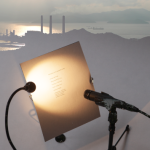
Cayley's image is an apt illustration of an essay that's also a work of 'digital language art.' Although Cayley incorporates new material and newly contextualized examples, referring chiefly to his own work, what follows is also the reconfigured rewrite of a recent essay for a series of conferences and a peer-reviewed online journal, Political Concepts, which can be found online at: https://www.youtube.com/watch?v=LDJRQYRWpvQ.
Cyborg Authorship: Writing with AI – Part 1: The Trouble(s) with ChatGPT
Scott Rettberg
In this anticipation of John Cayley's ebr essay on Artificial Intelligence, Scott Rettberg contextualizes some of the ethical and systemic problems of ChatGPT and argues that works of electronic literature and digital art might serve as tutor texts for understanding effects of technological mediation on humanity.
The development of Internet Fiction in China, from Internet sub-culture to mainstream literature
Serafina Aquilino
"Why," Serafina Aquilino asks, "is Internet literature so popular in China, compared to other countries?" The answer may be found in the Chinese "unique literary production." Print, nothing less, is responsible for China's world leadership in e-Lit. An unexpected emergence that Aquilino describes in her "brief history" of e-Lit in China, from Cai Zhiheng’s The First Intimate Contact (1998) to the present rise of Chinese literary forums and literary websites.
Response to John Cayley’s ‘Modelit’
Stephen Dougherty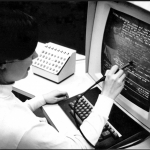
In his response to John Cayley, Dougherty takes the current concern with AIwriting as an opportunity to revive one of ebr's long-running threads; namely: the critical, contrarian riPOSTe.
Textpocalypse Now?
Søren Bro Pold
Pold extends Heckman's "thrilling (if not chilling)" critique to left-wing understandings and critical takes by theorists such as Walter Ong, Bernard Stiegler, and Vannevar Bush.
Erroneous Assumptions: Steve Tomasula’s Ascension
Stuart Moulthrop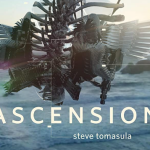
Taking an ironic, Icarian twist on Steve Tomasula's Ascension, Stuart Moulthrop situates Tomasula's novel in a subterranean, encyclopedic lineage that includes print fictions like Joyce’s Ulysses, Dos Passos’ U.S.A. trilogy, Pynchon’s Gravity’s Rainbow, DeLillo’s Underworld, David Foster Wallace’s Infinite Jest, and Zadie Smith’s White Teeth – novels that are, as Edward Mendelson put it, “the products of an epoch in which the world's knowledge is larger than any one person can encompass.” It's an experimental lineage that is, arguably, one of the more noteworthy carryovers from print to digital literature; a genre that Moulthrop (2013) and his near contemporary Michael Joyce (2007) have termed the “novel of internet.”
On Digital Aesthetics: Sense-Data and Atmospheric Language
Mujie Li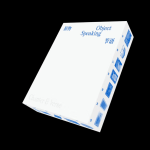
This article examines how the formation of data can be seen as an aesthetic way of making sense. Following work in digital aesthetics, the article proposes to understand digital artifacts and processes via formalization and operation of media language. Li traces this idea through several examples from recent literature, film, games, and artwork in South-East Asia. Together with these examples, Deleuze’s philosophical thoughts on a genesis of sense production are re-considered in order to understand a formal way of making sense in producing the new. The notion of “abstraction” from ancient Chinese mathematical thought offers a re-consideration of Deleuze’s “intensive virtual”, that is, the way the formal, the operative and abstraction determine the extensive intensive. Sense-Data and atmospheric language address computation’s materiality in engendering the formal and the operative modalities of media language, as a way of producing states of being and becoming in cultural activities in which the digital is an agency.
Thoughts on the Textpocalypse
Davin Heckman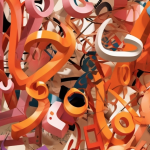
Davin Heckman offers thoughts on Matthew Kirschenbaum's now well-known essay in The Atlantic, The Textpocalypse (2023). Contemplating our own limits in digital media scholarship, including the reinforcing of technological determinisms, Heckman discusses the concept of transindividuation and its relationship with technology, or, the process of becoming an individual through participation in culture and society.
A review of My Life as an Artificial Creative Intelligence (2022)
David Thomas Henry Wright
In his review of Mark Amerika's My Life as an Artificial Creative Intelligence (2022), David Thomas Henry Wright highlights Amerika's negotiation of human, nonhuman, symbiotic creative practices in comparison with more traditional (including traditionally experimental) forms of writing.
Scott Rettberg Netprov Interview Oct 2022
Scott Rettberg, Rob Wittig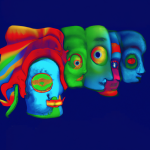
Rob Wittig and Scott Rettberg discuss the pioneer times in digital writing and electronic literature, a time long ago, in a Galaxy far away, when the audience at literary events did not have a clue about hypertext and links.
Alex Mitchell Netprov Interview Nov 2022
Alex Mitchell, Rob Wittig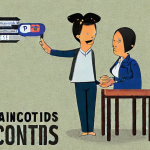
Rob Wittig and Alex Mitchell discuss the very beginnings and the most recent iterations of Netprov, with a focus on generative AI, collaboration and improvisational writing.
‘A Shifting Surface World’: The Techno-Graphomania of David Jhave Johnston’s ReRites
George MacBeth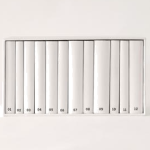
Avoiding the "twin pitfalls of either Luddite dread or AI boosterism," in this essay George MacBeth offers a close Re-Reading of Jhave's ReRites.
My Month with Midjourney
Ian Demsky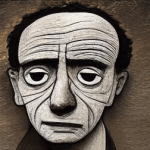
In this republished Medium essay, Ian Demsky takes a personal and playful dive into AI image generation.
Open, but not too much. A review of Emanuela Patti’s Opera aperta. Italian Electronic Literature from the 1960s to the Present
Roberta Iadevaia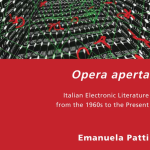
Starting with Umberto Eco's 1962 essay, "Opera aperta," and progressing into Emanuela Patti's tentative forays into Italian Electronic Literature from the 1960s to the Present, Roberta Iadevaia nicely locates a trajectory for Italian e-Lit, albeit one that is still open, "in contention," without any "encyclopedic guarantee, and no single world order on which our imaginative projections can rest."
Johannah Rodgers Netprov Interview, Oct 2022
Johannah Rodgers, Rob Wittig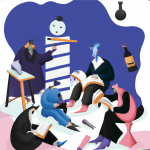
Rob Wittig and Johannah Rodgers – an independent scholar and a digital writer – discuss the collaborative and community-building nature of Netprov.
Image: DALL·E 2023-03-02 19.55.13 - "a group of people writing collectively a novel on financial crisis."